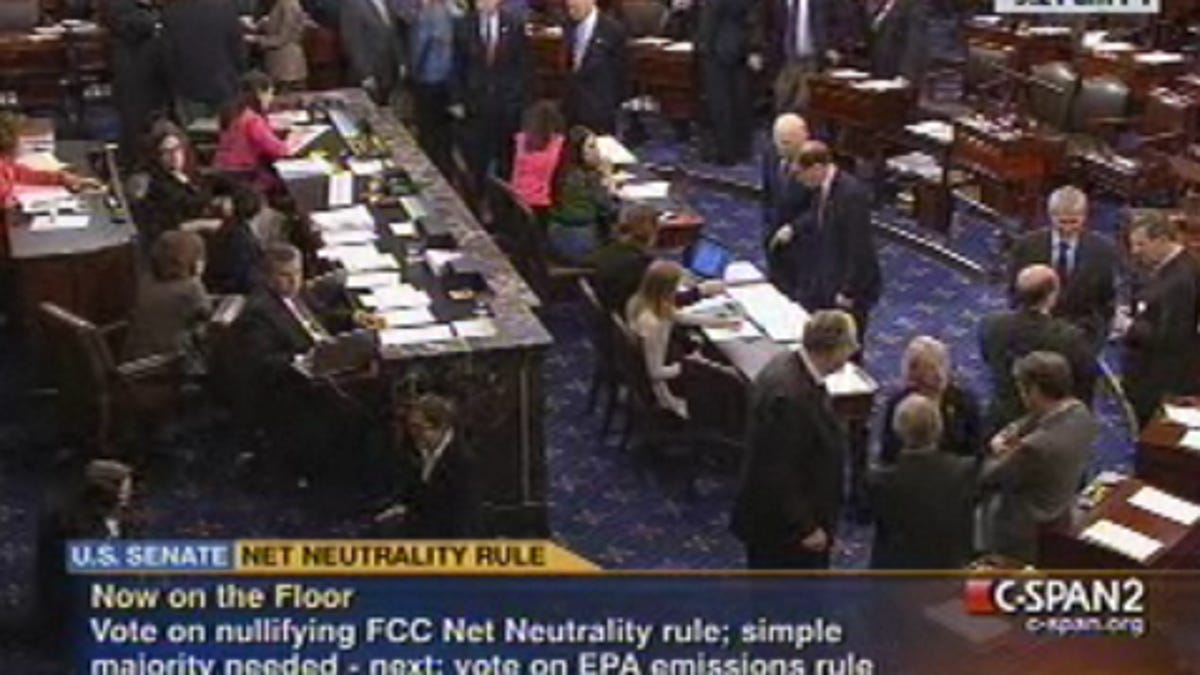Senate upholds FCC's Net neutrality regulations
By 46-52 vote, GOP effort to overturn FCC's Net neutrality rules fails. It would have needed a two-thirds supermajority to overcome a presidential veto threat.

An effort on Capitol Hill to overturn the federal government's controversial Net neutrality regulations failed today.
By a 46-52 vote, the U.S. Senate rejected a Republican-backed proposal that would have lifted the regulations before they take effect on November 20.
This morning's vote was an anticlimactic affair. A veto threat two days earlier from President Obama, coupled with evidence that there was nowhere near a two-thirds supermajority in both chambers, meant that the repeal effort would fail.
The Federal Communications Commission adopted the regulations by a 3-2 party line vote last December. Once they take effect, broadband providers will have to follow new rules--which many say are invalid because they have no legal basis--dealing with blocking or unreasonably discriminating against traffic on their networks.
The Senate vote also fell entirely along party lines: all Democrats opposed the regulatory repeal, and all Republicans supported it. Because the GOP has fewer senators, it failed. (Sens. John McCain (R-Ariz.) and Daniel Inouye (D-Hawaii) did not vote.)
Even though the final outcome of the congressional process was no longer in doubt, politicians from both major parties used the opportunity to laud or denounce the FCC's rule.
"If we're going to keep an open and free Internet, and keep the jobs (it creates), we should reject the FCC regulation on Net neutrality," said Sen. Kay Bailey Hutchison, a Texas Republican. "The FCC has essentially granted itself power over all forms of communication, including the Internet."
During yesterday's floor debate, Sen. Maria Cantwell (D-Wash.) argued that there has already been a case in which a network provider throttled traffic it deemed excessive. After initially denying it, Comcast eventually acknowledged it blocked some BitTorrent traffic to ease network congestion, prompting complaints from consumer advocacy groups.
"That's what's happening, these providers who think if I can control the pipe now I can also control the flow," Cantwell said. "Why allow telcos to run wild on the Internet charging consumers anything they want based on the fact that they have control of the switch?"
By a 240-179 vote, the House of Representatives already adopted the resolution required to overturn the FCC's rules.
A resolution of disapproval is a formal process, outlined in the Congressional Review Act, that permits Congress to overturn decisions of federal agencies. It requires both the House and the Senate to vote, and is subject to a presidential veto, but is not subject to a filibuster and only requires 51 votes to clear the Senate.
In 2006, Democrats and their allies in liberal special interest groups had supported an effort to explicitly grant the FCC the power to regulate broadband providers' network management practices. It failed in both a House floor vote and in a Senate committee vote.
That left the FCC's Democratic majority on extremely shaky legal ground, something that Republican Commissioner Robert McDowell highlighted (PDF) in his dissent last year, which said the agency "does not have the legal authority to issue these rules." (It also means that if President Obama is not reelected next year, the next FCC will presumably have a Republican majority that can vote to nix Net neutrality.)
In April 2010, a federal appeals court agreed, unceremoniously slapping down the FCC's attempt to impose Net neutrality penalties on Comcast for its temporary BitTorrent throttling.
Verizon Communications and MetroPCS have sued to overturn the FCC's more formal regulations. The companies met with an early setback because of a legal technicality--a court said the lawsuit was premature--so they filed it again in September once the regulations were final.

